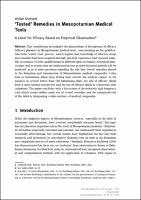Chapter ‘Tested’ Remedies in Mesopotamian Medical Texts
A Label for Efficacy Based on Empirical Observation?
| dc.contributor.author | Steinert, Ulrike | |
| dc.contributor.editor | Cale Johnson, J. | |
| dc.date.accessioned | 2019-11-13 23:55 | |
| dc.date.accessioned | 2020-01-07 16:47:06 | |
| dc.date.accessioned | 2020-04-01T09:29:47Z | |
| dc.date.available | 2020-04-01T09:29:47Z | |
| dc.date.issued | 2015 | |
| dc.identifier | 1006321 | |
| dc.identifier | OCN: 1135855019 | en_US |
| dc.identifier.uri | http://library.oapen.org/handle/20.500.12657/23815 | |
| dc.description.abstract | This contribution investigates the phraseology of descriptions of efficacy (efficacy phrases) in Mesopotamian medical texts, concentrating on the qualification latku ‘tested, tried, proven’, which implies that knowledge of effective drugs and remedies had been acquired through practical experience and repeated trials. The occurrence of latku-qualifications in different types or formats of medical manuscripts and in recipes that are duplicated in one or more historical periods will be analyzed, so as to raise questions regarding the role that ‘tested’ remedies played in the formation and transmission of Mesopotamian medical compendia. I also look at information about drug testing from outside the medical corpus, as for instance in several letters from Old Babylonian Mari, the role of efficacy labels from a cross-cultural perspective and the use of efficacy labels in connection with colophons. The paper concludes with a discussion of the relatively high frequency with which extract tablets make use of ‘tested’ remedies and the categorical role of the label in designating certain sections of medical compendia. | |
| dc.language | English | |
| dc.subject.classification | thema EDItEUR::N History and Archaeology::NH History::NHG Middle Eastern history | en_US |
| dc.subject.classification | thema EDItEUR::Q Philosophy and Religion::QR Religion and beliefs::QRM Christianity | en_US |
| dc.subject.classification | thema EDItEUR::Q Philosophy and Religion::QR Religion and beliefs::QRR Other religions and spiritual beliefs::QRRT Indigenous, ethnic and folk religions and spiritual beliefs::QRRT1 Indigenous religions, spiritual beliefs and mythologies of the Americas | en_US |
| dc.subject.other | early scientific thought | |
| dc.subject.other | compilation and redaction in the ancient world | |
| dc.subject.other | infrastructural compendia | |
| dc.subject.other | empiricism | |
| dc.title | Chapter ‘Tested’ Remedies in Mesopotamian Medical Texts | |
| dc.title.alternative | A Label for Efficacy Based on Empirical Observation? | |
| dc.type | chapter | |
| oapen.identifier.doi | 10.1515/9781501502507-006 | |
| oapen.relation.isPublishedBy | 2b386f62-fc18-4108-bcf1-ade3ed4cf2f3 | |
| oapen.relation.isPartOfBook | c92480a7-ce87-4e4b-9a17-0de50ff2d484 | |
| oapen.relation.isFundedBy | 7292b17b-f01a-4016-94d3-d7fb5ef9fb79 | |
| oapen.relation.isbn | 9781501510762; 9781501502521 | |
| oapen.collection | European Research Council (ERC) | |
| oapen.grant.number | 323596 | |
| oapen.grant.acronym | BabMed | |
| oapen.identifier.ocn | 1135855019 |

